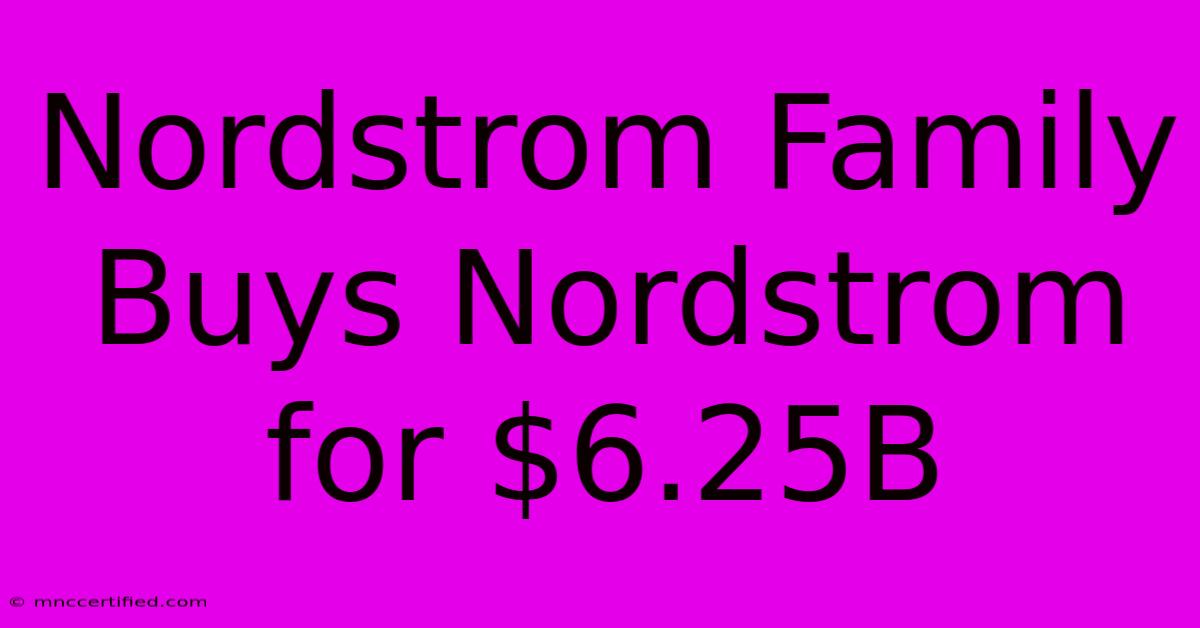Nordstrom Family Buys Nordstrom For $6.25B

Table of Contents
Nordstrom Family Buys Nordstrom for $6.25B: A Look at the Buyout and its Implications
The retail landscape just shifted. In a dramatic move that sent shockwaves through the industry, the Nordstrom family has orchestrated a $6.25 billion buyout of the publicly traded Nordstrom Inc., taking the iconic department store chain private. This monumental transaction marks a significant turning point for the company and raises numerous questions about its future direction. This article delves deep into the details of this buyout, its potential impacts, and what it means for the future of Nordstrom.
The Details of the Buyout
The deal, announced on [Insert Date of Announcement], saw a consortium led by the Nordstrom family – including Chairman Emeritus Bruce Nordstrom and his siblings – acquire all outstanding shares of Nordstrom Inc. not already held by the family. The offer price of $52 per share represented a significant premium over the company's trading price leading up to the announcement, solidifying its appeal to shareholders. This buyout effectively ends Nordstrom's era as a publicly traded company, giving the family complete control over the company's strategic direction.
Why did the Nordstrom family make this move?
Several factors likely contributed to the family's decision to take Nordstrom private. These include:
-
Long-term strategic vision: Freed from the pressures of quarterly earnings reports and Wall Street expectations, the Nordstrom family can focus on a long-term vision for the company, potentially implementing changes and investments that may not have been feasible as a public company. This could include substantial investments in e-commerce, supply chain optimization, or store renovations.
-
Addressing competition: The department store sector is fiercely competitive. By going private, Nordstrom can adapt to shifting consumer preferences and the challenges posed by online retailers and fast fashion brands more swiftly and decisively. They can invest heavily in improving customer experience and enhancing their brand identity without the immediate need to please short-term investors.
-
Increased operational flexibility: Private ownership allows for more agile decision-making and less bureaucratic red tape. This flexibility is crucial in a rapidly changing retail market. The family can swiftly respond to market trends and implement changes without the scrutiny and delays that often accompany public company processes.
Implications for the Future of Nordstrom
The buyout has significant implications for various stakeholders:
-
Employees: The impact on Nordstrom employees remains to be seen. While there’s no immediate indication of widespread layoffs, the focus on long-term strategic goals could lead to restructuring and changes in operational processes.
-
Customers: Customers can anticipate changes in Nordstrom's offerings and overall shopping experience. The family's focus on long-term growth might translate to improved customer service, enhanced online shopping platforms, and a refined product selection. However, potential price adjustments remain a possibility.
-
Competitors: Nordstrom's competitors will likely analyze the buyout's impact and adjust their strategies accordingly. The move could spur further consolidation or strategic shifts within the department store sector.
SEO Optimization and Keywords
This article utilizes several SEO strategies, including:
-
Keyword integration: The article naturally incorporates relevant keywords like "Nordstrom buyout," "Nordstrom family," "$6.25 billion," "private equity," "department store," "e-commerce," "retail," "supply chain," and "customer experience."
-
Header structure: The use of H2 and H3 headings improves readability and allows search engines to easily understand the article's structure and topic hierarchy.
-
Bold text: Key phrases are bolded to emphasize important information and improve scannability.
-
Long-tail keywords: The article incorporates long-tail keywords like "impact of Nordstrom buyout on employees" and "Nordstrom's future after privatization."
This buyout represents a significant moment in retail history. The Nordstrom family's decision to take the company private offers both opportunities and challenges. Only time will tell if this move ultimately benefits the company, its employees, and its customers. The coming years will be crucial in determining the success of this ambitious undertaking. Further updates and analyses will be necessary to fully assess the long-term implications of this major shift.

Thank you for visiting our website wich cover about Nordstrom Family Buys Nordstrom For $6.25B. We hope the information provided has been useful to you. Feel free to contact us if you have any questions or need further assistance. See you next time and dont miss to bookmark.
Featured Posts
-
Hilltop Honey A Factory Story
Dec 24, 2024
-
Real Madrid Beats Sevilla Navas Farewell
Dec 24, 2024
-
2024 Potato Bowl Niu Game Summary
Dec 24, 2024
-
Why Father Of The Bride Resonates
Dec 24, 2024
-
Honda Nissan Merger Tough Job Choices
Dec 24, 2024